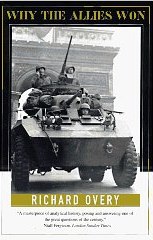Why the Allies Won
Overy explores in detail why the United Nations ultimately won the Second World War, and argues that their victory was not in fact inevitable. The first chapters provide a succinct and solid summary of the war, focussing on critical issues on the broad stage and weighing them with care and intelligence. Ovey is especially good in studying the air war, which he argues was far more important in defeating Germany than contemporary historians have generally acknowledged. He is willing, too, to explore the importance of the moral dimension: in the end, Germany’s defeat was good, and that fact helped ensure that Germany would be defeated. Ovey is not blind to Soviet ills, and sensibly explores that necessary alliance and its impact. The chapter on morality starts, peculiarly, by comparing religious attitudes in the combatant countries. Yes, FDR was a believer, and yes, Americans are more openly concerned with religion than most Europeans. These superficial attitudes seem unrelated to actual behavior, much less the outcome of the war.
